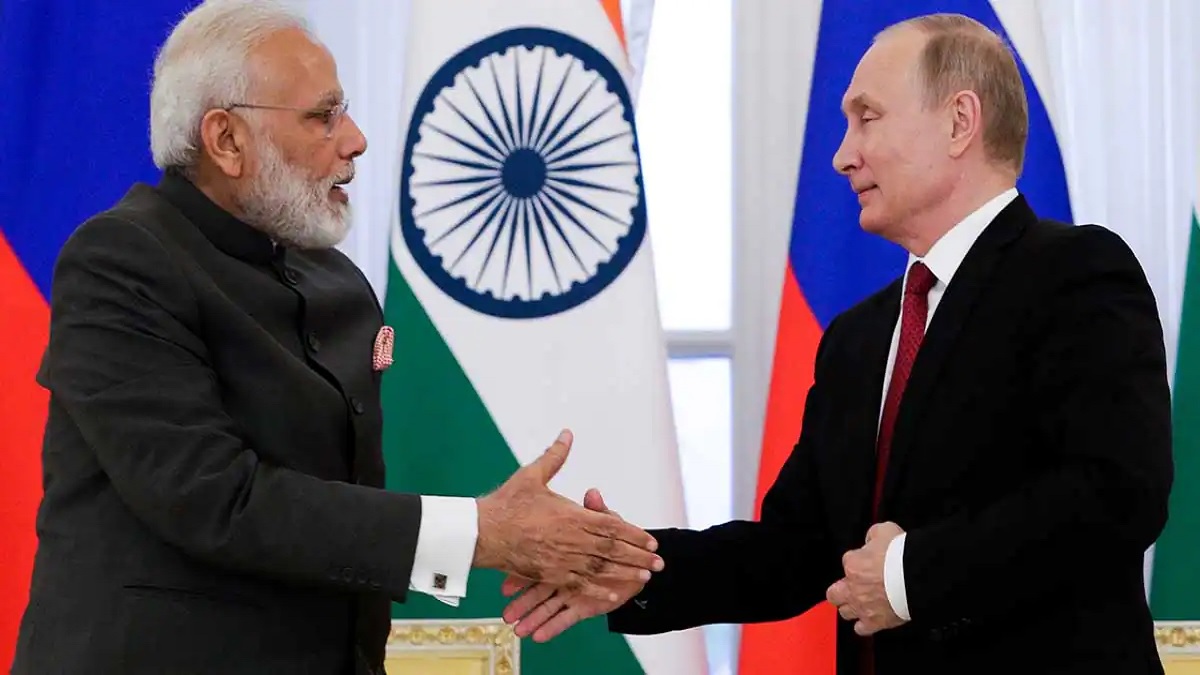

Developments in Ukraine, and the world’s responses, have given India an extraordinary opportunity to try and bring Russia closer to the West, by playing a proactive role in negotiating peace.
Prime Minister Narendra Modi, who has been called and acknowledged by top leaders on both sides, could even invite the two presidents for talks in New Delhi, offering the capital as a neutral and safe place for both.
President Putin and President Zelenskyy have expressed readiness to talk. They only disagree on the venue.
If necessary, Modi could invite the top leaders of Israel and Belarus to join him in this peace-making exercise. Each of them has been suggested by one of the two presidents in conflict as his preferred host for peace talks.
Nothing could suit India’s interests more than mutual accommodation between the West and Russia. For, that would draw Russia away from China, towards which the relentless slew of Western sanctions would inevitably drive him.
Already, Russia has very close ties with China. That link was demonstrated by the visit of China’s closest ally, Pakistan Prime Minister Imran Khan, to Moscow on the very day when Russia began what he preferred to call his ‘special operation,’ sending his military into Ukraine from various sides.
In the face of the West’s blocking Russian banks from the Swift network for banking transactions, China will surely try to draw Russia and Iran into its alternate network and persuade them to treat the Renminbi as their reserve currency to cope with Western sanctions.
Uncertain strategic advance
India’s cautious stances at the UN Security Council, of which it is a member this month, has given it a unique opportunity to play peace-maker. The best retort to those who have criticised this stance would be to don the mantle of peace-maker.
On the other hand, Russia’s tactics indicate that it does not, at least in the first few days of this conflict, want to crush Ukraine and kill civilians, if that can be avoided.
It is possible that those who planned the war hoped that the primarily Russian-speaking population in the east of Ukraine would welcome Russian forces, and become a base from where Kyiv could be taken.
They may have hoped that that would be sufficient to declare victory, to gradually bring other key centres under control, and install a more pro-Russian set-up in place of President Zelenskyy’s government.
It is a fact that most Ukrainians to the east of the river Dnieper have been less enthusiastic about Ukraine joining NATO or the EU than those who live to the west of that river. And those on the east have often voted for more pro-Russia parties than for pro-West ones.
But, if Russian strategists calculated that those people would therefore welcome Russian forces, they failed to factor in nationalism and patriotism — which seem to have kicked in across most of Ukraine.
The most striking aspect of the first three days of the war was the inability of Russian forces to quickly take control of eastern parts of the country — not even Kharkiv in the northeast of Ukraine, though it is just about 25 km from their border.
US strategists such as Donald Rumsfeld made the same mistake during their ‘shock and awe’ attack in Iraq. US soldiers were led to believe they would be welcomed with garlands. Instead, even those Iraqis who had hated Saddam Hussein fought the invaders and fought a debilitating insurgency for years.
Guarantees of neutrality
If there were miscalculations, President Putin would surely have realised by now that subduing Ukraine will be too costly — in the cost of war, the insurgency that will follow, Western sanctions, and the loss of global credibility.
Some analysts were already of the view that Putin only wanted a guarantee of Ukrainian neutrality between the West and Russia — specifically, that Ukraine (and Belarus and Georgia, which also border Russia) would not join NATO or even the EU.
Even if Putin actually intended to directly conquer at least the eastern half of Ukraine, as suggested by his speech negating Ukraine as a historically valid nation-state, the course of the war so far may have convinced him that ironclad guarantees of a neutral Ukraine would be enough.
India is best placed to put this sort of via-media before the concerned parties and convince the world that it is the best way out of a very messy situation.
In the context of the threat India faces from the Sino-Pak alliance, this denouement in Europe would be in India’s best interests. For, it would set the stage for more understanding, and economic links, between Russia and the West.
That would allow India to more easily obtain arms and other equipment from both. As things stand, the deepening rift between the West and Russia could hobble India’s choices very badly. Russia would inevitably embrace China and Pakistan more closely, while the West would apply fierce sanctions.
India should in any case note the unprecedented popularity of Ukrainian freedom, and its President Zelenksyy. If he survives this war, the young and multi-talented leader would surely be a shoo-in as UN Secretary-general in the future, not to speak of the Nobel Peace Prize.
Both Putin and Zelenskyy could emerge as key players in the next few decades. What better role could one have than that of peace-maker between them.
(David Devadas is the author of The Story of Kashmir and The Generation of Rage in Kashmir.)